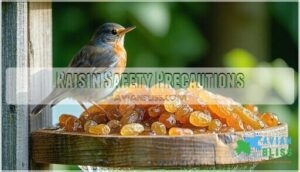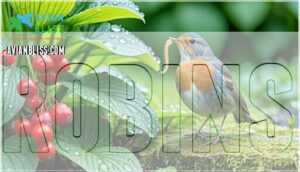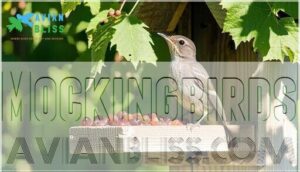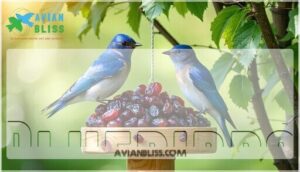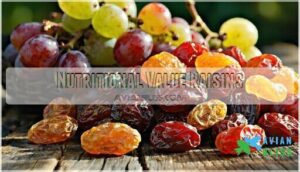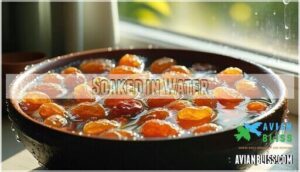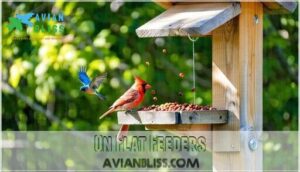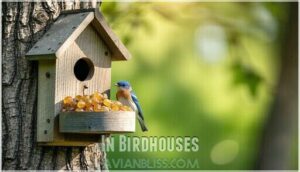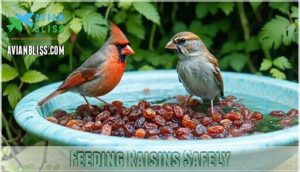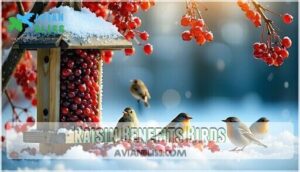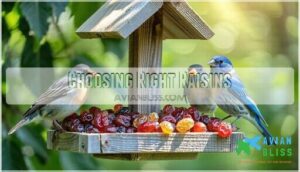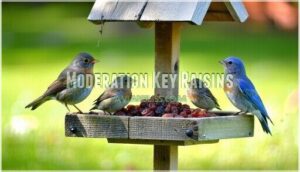This site is supported by our readers. We may earn a commission, at no cost to you, if you purchase through links.
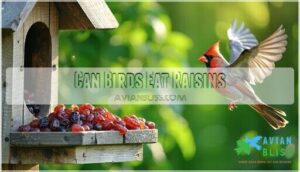
These dried grapes pack essential vitamins, minerals, and natural sugars that provide quick energy for active birds.
Popular backyard visitors like robins, cardinals, mockingbirds, and bluebirds readily gobble up raisins when offered.
You’ll want to soak them in water first, especially during dry weather, to make them easier to digest and prevent choking.
Choose organic, seedless varieties without added sugars or preservatives for the healthiest option.
While raisins make excellent treats, they shouldn’t replace a bird’s primary diet.
The secret lies in knowing which preparation methods work best for different species.
Table Of Contents
- Key Takeaways
- Birds Eating Raisins
- Can Birds Eat Raisins
- Raisin Safety Precautions
- Birds That Enjoy Raisins
- Nutritional Value Raisins
- Serving Raisins Birds
- Feeding Raisins Safely
- Raisin Benefits Birds
- Choosing Right Raisins
- Moderation Key Raisins
- Frequently Asked Questions (FAQs)
- Are raisins safe for birds?
- Can you put raisins in a bird feeder?
- Why do birds love raisins?
- Can birds eat oats and raisins?
- Can raisins lead to crop impaction in birds?
- How many raisins are too many for birds?
- Which birds should avoid raisins due to health concerns?
- Are organic raisins better for birds than conventional?
- Can raisins attract unwanted pests to bird feeders?
- Can baby birds eat raisins safely?
- Conclusion
Key Takeaways
- You’ll need to prepare raisins properly – Always soak them in water for 5-10 minutes to soften and prevent choking, especially for smaller birds like finches and robins.
- Choose organic, seedless varieties without additives – Avoid raisins with added sugars, preservatives, or sulfur dioxide that can harm birds’ delicate digestive systems.
- Keep raisins as occasional treats, not daily staples – Limit them to 5-10% of a bird’s total diet to maintain proper nutritional balance and prevent health issues.
- Many common backyard birds love raisins – Species like cardinals, mockingbirds, bluebirds, and waxwings readily eat raisins, especially during winter when natural food sources are scarce.
Birds Eating Raisins
You’ll find that many wild birds can safely eat raisins as an occasional treat when prepared properly.
These dried fruits offer valuable nutrients and energy that support avian health throughout the year.
Nutritional Benefits
When offering raisins to backyard birds, you’re providing a nutritional powerhouse packed with essential vitamins and minerals.
These dried grapes contain vitamin B6, iron, and potassium that support bird health, while their fiber content aids digestion.
The mineral richness includes calcium for strong bones and magnesium for muscle function, making raisin nutrition birds can truly benefit from throughout the year.
Energy Source
Raisins deliver Quick Energy through their concentrated Sugar Content, making them ideal Flight Fuel for birds with high Metabolic Needs.
Raisins pack concentrated natural sugars that fuel birds’ high-energy demands instantly.
The natural sugars provide immediate energy for daily activities and Winter Survival when other food sources become scarce.
Here are four key energy benefits when birds eat raisins:
- Instant glucose boost – Natural fructose and glucose offer immediate energy for flight and foraging activities
- Sustained energy release – Complex carbohydrates provide longer-lasting fuel throughout the day
- Winter energy reserve – High calorie density helps birds maintain body heat during cold months
- Quick recovery fuel – Rapid sugar absorption aids birds recovering from migration or breeding stress
The concentrated energy in raisin bird food makes it particularly valuable during harsh weather when birds burn more calories staying warm.
This bird energy source becomes especially important when natural food supplies dwindle, giving our feathered friends the raisin benefits birds need to thrive year-round.
Vitamin Supplement
Beyond quick energy, you’ll find raisins pack impressive vitamin content that supports your feathered friends’ health.
These dried grapes deliver B-complex vitamins that boost immune support and enhance avian health through improved blood cell production.
| Vitamin Category | Bird Health Benefits |
|---|---|
| B-Complex Boost | Red/white blood cell production, energy metabolism |
| Vitamin A | Vision health, feather development |
| Vitamin C | Immune support, antioxidant protection |
| Vitamin K | Blood clotting, bone strength |
The raisin nutrition birds receive includes essential minerals like potassium and iron.
This vitamin variety makes raisins valuable nutritional benefits for wild birds when offered properly.
Can Birds Eat Raisins
Yes, birds can safely eat raisins when offered properly. These dried grapes provide natural sugars, vitamins, and minerals that support bird health.
Wild birds like robins, cardinals, and woodpeckers readily consume raisins, while captive birds also benefit from this nutritious treat. Bird digestion handles raisins well since they’re naturally soft and contain easily absorbed nutrients.
Unlike toxic fruits such as avocado or chocolate, raisins pose no inherent danger to most bird species. However, raisin allergies in birds are extremely rare, making them a reliable food choice.
The key difference between wild vs captive birds lies in portion control. Wild birds naturally regulate their intake, while pet birds need measured amounts. Choose organic, unsweetened raisins without preservatives or added sugars.
To supplement their diet, consider that birds also enjoy nutrient-rich strawberries. You can confidently add raisins to your bird diet plan. They serve as excellent raisin alternatives to processed treats.
When feeding birds raisins, remember that moderation guarantees the best nutrition without overloading their system with natural sugars.
Raisin Safety Precautions
While raisins offer excellent nutrition for birds, you’ll need to take proper safety measures to protect their health.
Choose organic, unsulfured raisins and always soak them in water before serving to prevent choking and improve digestibility.
Avoid Pesticides
Choose organic raisins whenever possible to minimize toxic pesticide exposure that threatens bird health.
Standard raisins contain an average of 13 different pesticide residues, with 99% testing positive for multiple chemicals.
Washing raisins thoroughly with baking soda solution helps remove surface contaminants.
Safe sourcing protects birds from neurotoxic compounds that impair development and reproduction.
To reduce exposure, consider methods for removing pesticide residues before feeding.
Store Properly
Proper storage keeps your raisins fresh and safe for bird feeding.
Keep raisins in airtight containers to prevent spoilage and avoid pests that might contaminate your bird food.
Store them in cool darkness, like a pantry or cupboard, away from heat and moisture.
For longer storage, fridge storage works well and extends freshness.
Fresh raisins make better bird treats than stale ones, and proper storage is key to maintaining their quality, ensuring they remain safe and fresh for the birds.
Limit Quantity
Moderation serves as your compass when offering raisins to birds.
Keep their daily allowance under 5-10% of total food intake to prevent overfeeding and maintain dietary balance.
Portion control matters—a few raisins per day suffices for most birds.
Avoid excess sugar by limiting these sweet bird treats, as too many can disrupt their natural diet and health.
Birds That Enjoy Raisins
Many wild birds find raisins irresistible, especially during winter when natural food sources become scarce.
You’ll attract species like robins, cedar waxwings, northern mockingbirds, and eastern bluebirds by offering these sweet, nutrient-packed treats in your backyard feeders.
Robins
Robins enthusiastically consume raisins year-round, making these dried fruits excellent additions to Robin Diets.
When you offer soaked raisins, you’ll notice robins prefer the softened texture over hard, dry ones.
These nutritious treats support Robin Behavior during migration periods and harsh winter months when natural food sources become scarce.
Both dark and golden raisins provide essential vitamins that enhance Robin Conservation efforts in your backyard habitat.
Other birds, such as catbirds and waxwings, also enjoy raisins, making them a great addition to a fruit based diet, which is beneficial for overall bird conservation and supports a healthy backyard habitat.
Waxwings
Waxwings readily consume raisins as part of their diverse diet, especially during winter when natural fruit sources become scarce.
These striking birds with their distinctive waxy wing tips benefit substantially from raisin supplementation.
Here’s what makes raisins ideal for waxwings:
- Energy boost – Natural sugars provide essential fuel for their high metabolism
- Digestive support – Fiber content aids their fruit-focused digestive system
- Seasonal nutrition – Raisins fill nutritional gaps when fresh berries aren’t available
- Hydration assistance – Soaked raisins offer additional moisture content
Waxwings show strong raisin preference, consuming both dark and light varieties when you offer them at feeders.
You can also attract them by planting berry shrubs.
Mockingbirds
In contrast to other songbirds, mockingbirds readily eat raisins and benefit from their nutritional content.
These versatile birds consume various raisin types when you provide them properly soaked.
Mockingbirds use raisins to support their high-energy lifestyle and complex vocal performances.
| Aspect | Details |
|---|---|
| Mockingbird Diets | Include raisins alongside insects, berries, and seeds for balanced nutrition |
| Mockingbird Behavior | Active foraging makes raisins an ideal energy source for daily activities |
| Safety Guidelines | Soak raisins in water before offering to guarantee easy consumption |
| Feeding Frequency | Offer raisins occasionally as treats, not as primary food source |
Bluebirds
Bluebirds frequently consume raisins as part of their wild bird diet.
These colorful songbirds show strong bluebird raisin preference, especially during seasonal raisin feeding periods when natural food sources become scarce.
Here’s what you need to know about feeding fledgling bluebirds and adults:
- Raisin preparation methods: Soak raisins in water for easier consumption
- Bluebird feeder types: Use platform feeders for easy access
- Safe bird treats: Choose organic, seedless varieties without additives
- Bird diet raisins: Limit to 5% of total diet for ideal health
Are raisins safe for bluebirds? Yes, when properly prepared and offered in moderation.
Nutritional Value Raisins
Raisins pack an impressive nutritional punch that makes them excellent treats for backyard birds.
You’ll find these dried grapes loaded with essential vitamins A, B-complex, C, E, and K, plus essential minerals like calcium, iron, magnesium, potassium, and phosphorus that support strong bones, healthy feathers, and proper muscle function, including essential vitamins for overall health.
Vitamins and Minerals
Raisins pack impressive nutritional value for birds that eat raisins regularly.
These dried fruits contain vitamins A, B-complex, C, and K that support immune support and feather growth.
Essential minerals like calcium promote bone strength, while iron enhances blood health and potassium aids muscle function.
| Vitamin/Mineral | Bird Health Benefit |
|---|---|
| Vitamin A | Supports clear vision |
| B-Complex | Boosts energy conversion |
| Calcium | Strengthens bones |
| Iron | Improves blood health |
| Potassium | Enhances muscle function |
This vitamin and mineral combination makes raisins valuable for bird nutrition and overall health benefits.
Antioxidants
Beyond vitamins and minerals, raisins pack powerful antioxidants that work like tiny shields for your feathered friends.
These phenolic compounds provide cellular protection against damage while offering anti-inflammatory benefits.
When birds eat raisins regularly, they’re getting natural disease prevention tools that boost their immune systems.
The antioxidants in raisins help wild birds maintain peak health, supporting their ability to fight off infections and recover from environmental stressors more effectively.
Serving Raisins Birds
You can serve raisins to birds in several effective ways that make them more appealing and accessible.
The most popular methods include mixing them into suet cakes, soaking them in water to soften, placing them on platform feeders, or incorporating them into bird house feeding stations.
In Suet Cakes
Making homemade suet cakes with raisins creates nutritious winter treats that birds can’t resist.
Mix one part chopped raisins with three parts melted suet for the ideal suet raisin ratio. Add binding agents like peanut butter or cornmeal to hold everything together.
For those interested, you can find a raisin suet recipe online.
Consider texture considerations by chopping raisins smaller for finches or leaving whole for larger birds. Your seasonal suet recipes should match bird preferences – woodpeckers love chunky textures while smaller songbirds prefer smoother blends.
Soaked in Water
Soaking raisins in lukewarm water transforms these dried treats into bird-friendly morsels.
This simple preparation method offers multiple advantages for our feathered friends’ health and safety.
Here’s how soaking benefits birds:
- Soaking Duration: Five to ten minutes softens tough exteriors
- Water Temperature: Lukewarm water prevents shocking delicate digestive systems
- Improved Digestion: Softened raisins reduce choking risks for smaller species
- Hydration Benefits: Extra moisture supports winter feeding when water’s scarce
- Nectar Enhancement: Leftover soaking water sweetens homemade nectar mixes naturally
This preparation method guarantees birds eat raisins safely while maximizing nutritional absorption.
Many people seek chewy soaked raisins as a treat for their birds.
On Flat Feeders
Platform feeders offer the perfect stage for serving raisins to backyard birds.
You’ll want to choose weather-resistant materials and make certain proper bird accessibility through strategic feeder placement.
| Feeder Aspect | Best Practice |
|---|---|
| Material Choice | Cedar or recycled plastic for durability |
| Feeder Placement | 5-6 feet high, near shrubs for cover |
| Weather Protection | Covered design prevents rain damage |
| Cleaning Frequency | Weekly washing with mild soap solution |
| Bird Accessibility | Open sides allow multiple birds to feed |
This setup attracts various species while keeping your bird feeding tips effective and raisins safe from spoilage.
Consider easy to use feeders for simple maintenance and bird attraction.
In Birdhouses
Why place raisins in birdhouses when traditional feeders exist? Birdhouse placement creates protected feeding environments for cavity-nesting species like Eastern Bluebirds and woodpeckers.
Secure small dishes inside prevent raisin spoilage while ensuring raisin accessibility. Pre-soak raisins for easier consumption and maintain birdhouse hygiene by removing uneaten portions within 24 hours.
Consider using a birdhouse raisin dish for ideal presentation. These nesting raisins provide essential energy during breeding seasons for backyard birds, and are a great way to support backyard birds.
Feeding Raisins Safely
When feeding raisins to birds, you’ll want to prepare them properly to guarantee safety and maximum enjoyment.
Soaking raisins in water for 5-10 minutes softens them and makes them easier for smaller birds to digest while removing any surface impurities, which is crucial for their enjoyment.
Soak in Water
You’ll want to soak raisins in lukewarm water for 5-10 minutes before offering them to birds.
This soaking duration softens the dried fruit, making it easier for smaller birds to eat.
Water temperature should be warm but not hot.
Enhanced hydration occurs as raisins plump up, while impurity removal helps eliminate pesticides or chemicals.
Remember to wash thoroughly to remove pesticides, as safe bird food options are essential for avian health.
Save the vitamin-rich soaking water for nectar infusion later, using the cleaned and prepared raisins for a healthy treat, promoting overall wellness.
Mix With Nectar
Enhanced nutrition becomes a reality when you create a raisin-nectar mix for backyard birds.
Soak raisins in water, then add the drained liquid to your standard nectar recipe for increased sweetness and hydration boost.
This combination attracts orioles and tanagers while providing essential minerals.
Always use additive-free raisins and maintain proper bird preferences through balanced feeding ratios.
Add to Suet
Creating nutritious bird suet becomes effortless when you incorporate raisins as binding agents.
Mix chopped raisins into your homemade bird suet recipe, ensuring even raisin distribution throughout the mixture.
The natural sugars help achieve proper suet consistency while attracting diverse bird preferences.
Consider seasonal variations—winter suet benefits from extra raisins since birds eat raisins enthusiastically when other food sources are scarce, making your bird feeder irresistible.
Raisin Benefits Birds
Raisins offer your backyard visitors a concentrated energy boost packed with natural sugars that fuel their high-energy lifestyle.
These dried fruits also provide essential hydration when soaked in water, making them particularly valuable during winter months when fresh water sources may be scarce, offering a concentrated energy boost and natural sugars.
Energy Boost
Raisins serve as flight fuel for birds, meeting their high metabolic demands with concentrated sugar content.
When birds eat raisins, they receive quick energy that supports their activity levels and daily nutrition needs.
Here’s how raisins boost bird energy:
- Natural sugars – Fructose and glucose provide immediate fuel for flight
- High calorie density – Concentrated energy in small, easy-to-eat portions
- Rapid absorption – Simple carbohydrates enter bloodstream quickly
- Sustained activity – Supports foraging, migration, and territorial behaviors
Hydration Aid
You’ll boost hydration when you soak raisins in water before serving.
Soaking benefits include softening raisins for easy digestion while creating vitamin-rich water that doubles as a nectar substitute.
This winter hydration method helps birds stay healthy during cold months when water sources freeze.
These serving methods make dried fruit more appealing and nutritious for your feathered visitors, and also provide a way to create a healthy environment.
Choosing Right Raisins
When selecting raisins for birds, you’ll want to choose organic, unsulphured varieties without added sugars or preservatives that could harm their health.
Always opt for seedless raisins to prevent choking hazards, and check labels carefully to verify you’re providing the safest option for your feathered visitors.
Organic Options
When you’re shopping for bird treats, organic raisins are your best bet for keeping feathered friends healthy and happy.
- Pesticide concerns: Conventional grapes often contain harmful chemical residues
- Sulphur dioxide: Many commercial raisins use this preservative that’s toxic to birds
- Organic certification: Guarantees no synthetic chemicals during growing or processing
- Washing needed: Even organic raisins benefit from a quick rinse before serving
- Eco-friendly raisins: Support sustainable farming while protecting bird safety
Organic raisins eliminate worries about chemical exposure, making them the safest bird treats available.
Seedless Raisins
You’ll find seedless raisins offer the preferred variety for bird feeding since they eliminate choking hazards that concern many bird lovers.
Smaller birds can safely consume these without struggling with seeds, making easy feeding a reality.
Most commercial raisins are already seedless, so you won’t need to hunt for special varieties.
Are raisins safe? Yes, when you choose seedless options that prioritize bird safety and reduce feeding complications.
Avoid Added Sugars
Checking ingredient labels protects birds from harmful additives that masquerade as healthy treats.
You’ll find raisins with added sugar, artificial sweeteners, and honey coating—all dangerous for feathered friends.
Natural sweeteners and sugar alternatives might seem harmless, but birds eat raisins best when they’re plain.
Fructose concerns arise when manufacturers boost sugar content beyond natural levels.
Safe amounts mean choosing unsweetened varieties where moderation in health matters most.
Moderation Key Raisins
You’ll want to keep raisins as an occasional treat rather than a daily staple, limiting them to just 5-10% of your bird’s total diet.
Too many raisins can upset their nutritional balance and lead to health problems, so monitor your feathered visitors to verify they’re maintaining a varied, healthy eating pattern.
Balance Diet
When you feed wild birds raisins, remember that balance matters most in their diet.
Raisins should complement natural food sources rather than replace them, making up only 5-10% of daily intake.
Wild diets vary with seasonal changes, so adjust supplementation needs accordingly.
Food variety guarantees proper nutrient ratios – mix raisins with seeds, nuts, and suet.
A balanced diet keeps birds healthy year-round.
Monitor Health
Watch your bird carefully after offering raisins.
Look for Weight Changes, unusual Behavior Changes, or shifts in Appetite Changes that signal problems.
Check Feather Condition regularly – dull or damaged feathers may indicate poor digestion or nutritional imbalances.
Dropping Analysis reveals digestive health through color and consistency changes.
These monitoring steps help guarantee that raisins support rather than harm bird health, ensuring overall digestive health.
Frequently Asked Questions (FAQs)
Are raisins safe for birds?
Yes, raisins are safe for birds when prepared properly.
You’ll want to choose organic, unsweetened varieties and soak them briefly to soften.
Limit portions to 5-10% of their diet for best health.
Can you put raisins in a bird feeder?
You can definitely put raisins in bird feeders.
Soak them first to soften, then place in platform feeders or mix with seeds.
Choose organic, additive-free raisins and remove uneaten portions promptly.
Why do birds love raisins?
Birds naturally crave raisins because they’re packed with 15 essential vitamins and minerals.
You’ll find they’re drawn to the natural sugars providing quick energy for their high metabolism, plus the fiber supporting healthy digestion and antioxidants boosting immunity, which includes the benefit of antioxidants.
Can birds eat oats and raisins?
You can safely feed birds both oats and oats together, providing them with carbohydrates and fiber.
Oats and raisins offer a good combination of nutrients, as raisins provide natural sugars and vitamins.
Soak raisins beforehand to soften them, and limit both treats to small portions.
Can raisins lead to crop impaction in birds?
Can proper preparation prevent problems? Absolutely!
Whole raisins can cause crop impaction if they’re too large or hard.
You’ll avoid this risk by soaking raisins beforehand and chopping them into smaller pieces for safer digestion, which helps prevent problems through proper preparation.
How many raisins are too many for birds?
You shouldn’t feed birds more than a few raisins daily, keeping them under 5-10% of their total diet.
Excessive amounts can cause digestive issues and nutritional imbalances in your feathered friends.
Which birds should avoid raisins due to health concerns?
Most birds can safely eat raisins without health concerns.
However, you should avoid feeding raisins to birds with diabetes, kidney problems, or those prone to obesity, as raisins’ high sugar content could worsen these conditions.
Are organic raisins better for birds than conventional?
Organic raisins shine like precious gems for your feathered friends.
They’re free from harmful pesticides and preservatives that can damage birds’ delicate systems.
Choose organic varieties to guarantee you’re providing the cleanest, safest treat possible.
Can raisins attract unwanted pests to bird feeders?
Yes, leftover raisins can attract ants, flies, and rodents to your feeder.
You’ll want to remove uneaten raisins daily and clean feeding areas regularly to prevent mold growth and unwanted visitors from settling in.
Can baby birds eat raisins safely?
Baby birds shouldn’t eat raisins until they’re fully fledged and eating solid foods independently.
Their digestive systems can’t handle the concentrated sugars and fiber, potentially causing serious health issues or choking hazards, related to the fact that they are not yet able to eat solid foods.
Conclusion
Backyard feeding transforms ordinary moments into wildlife watching adventures, yet many overlook simple treats like raisins.
Now you understand can birds eat raisins safely when properly prepared. Soak them first, choose organic varieties, and offer in moderation alongside regular foods.
Your feathered visitors will appreciate these nutritious snacks during migration seasons and harsh weather. Remember that balanced feeding creates healthier bird populations while giving you countless hours of natural entertainment right outside your window.
- https://kennedywildbirdfood.co.uk/plain-wild-bird-seed/raisins-for-birds/
- https://wildlifechatter.com/bird-care/bird-feeding/can-birds-eat-raisins-and-sultanas/
- https://www.saharaukfoods.co.uk/can-birds-safely-eat-raisins/
- https://extensionpubs.unl.edu/publication/g2003/na/html/view
- https://www.healthline.com/health/food-nutrition/are-raisins-good-for-you

